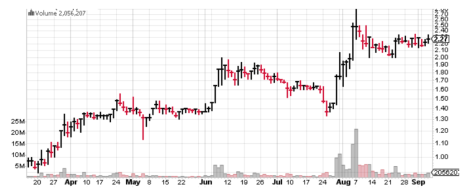Today, I’d like to introduce you to a tobacco stock that could be in for a nice boost thanks to the Food and Drug Administration (FDA). But first, I’d like to recognize what an important day it is.
Sixteen years ago today, terrorist attacks using hijacked airplanes killed nearly 3,000 people.
In the years since then, diligent focus on reducing risk has reduced the number of lives lost to terrorism in the U.S. to an average of 22 per year.
In the meantime, deaths attributable to tobacco use, which is the most common preventable form of death in the U.S., are running at 480,000 per year.
Why do we tolerate that huge number?
[text_ad]
We tolerate it in part because tobacco use is voluntary—and freedom is generally a good thing—and in part because tobacco use, culturally, was strongly encouraged only 50 years ago (thanks, Mad Men). And it takes time for culture to change.
But the FDA is working on it.
In fact, on July 28, the FDA, noting the huge costs of tobacco on our society, announced that it was exploring ways to make tobacco products “less toxic, appealing and addictive.”
Less toxic probably means electronic nicotine delivery systems (ENDS), popularly known as vaping.
Less appealing probably means restricting flavored products like menthol.
And less addictive almost certainly means reducing levels of nicotine.
Now, there’s no certainty that any of the FDA’s goals will be achieved. Certainly, the big tobacco companies will fight any change tooth and nail.
But look what happened to the stock of Altria (MO), formerly known as Philip Morris, immediately after the announcement.
That’s a drop of 15%! In short, the market is saying it expects the FDA to get traction in at least one of these areas. And it expects Altria to suffer as a result.
But there’s a tobacco company, and tobacco stock, that I think will benefit from the FDA’s efforts to reduce nicotine levels, and I want to tell you a bit more about it here.
Reducing Nicotine
This company (call it Company X) is the world’s leading authority on reducing nicotine levels in tobacco through both plant breeding and genetic engineering.
After years of hard work, they’ve succeeded in producing tobacco with 97% less nicotine than conventional tobacco.
In fact, as the only company in the world capable of producing Very Low Nicotine (VLN) tobacco products, Company X was chosen by the National Institute on Drug Abuse (NIDA) to supply its proprietary cigarettes as a subcontractor under a federal government contract.
The company’s main product line consists of a series of cigarette styles that have a fixed “tar” yield but varying nicotine yields over a 50-fold range—from very low to high.
Altogether, Company X makes 24 styles of these cigarettes (11 regular and 13 menthol versions), with eight different levels of nicotine content. To date, Company X has delivered over 22 million of these research cigarettes for the National Institute on Drug Abuse.
But so far—even though the FDA and other agencies of the U.S. federal government have invested more than $100 million in this science—you haven’t been able to buy them commercially.
So what will happen if the FDA mandates lower levels of nicotine?
Almost certainly, Altria and other manufacturers will license Company X’s patented technology so they can meet the FDA’s requirements. And then the cash will really start flowing.
And that’s a good thing, because today, Company X is not profitable; it’s still in research mode. But if the FDA achieves its goal, Company X could turn into a huge moneymaking machine!
Tobacco Stock with a Strong Chart
But don’t just take my word for it. Take a look at the chart of this tobacco stock, and see how investors reacted once they processed the FDA’s July 28 announcement and found the company that would be the likely winner.
Clearly, investors in the know are placing their bets on this tobacco stock. And if they’re right (and I’m right), this recent little surge is just the beginning of a long upward trend that will not only make early investors rich but also make Americans healthier.
And there’s more to the story!
After mastering the challenges of making low-nicotine tobacco, Company X attacked the challenge of making marijuana without THC.
And they succeeded!
Without THC, marijuana can bring numerous medical benefits, like pain relief and anxiety treatment, without the typical high. But before it tackles the medical marijuana market, Company X plans to target the commercial hemp industry, an industry that was quite healthy until the middle of the last century when the campaign to criminalize marijuana use doomed it.
In fact, Company X plans to lead the revitalization of the hemp industry worldwide!
So which of the company’s efforts will be more successful, low-nicotine tobacco or zero-THC hemp?
I don’t know. But I can tell you that I’m very excited about both the trend to safer tobacco and the trend to legalized marijuana, and I think there are some very big profits waiting for investors who get onto both trends early.
In fact, I recently completed the first issue of Cabot’s Ten Best Marijuana Stocks (it includes full details on Company X), and I’m even more excited about the profit potential in these stocks than when I started.
Bottom line: all the trends are in place, and it’s just a matter of time until revenue from legal marijuana businesses exceeds revenue from legal tobacco businesses.
So all you need to do to make money in the sector is read my profiles of these 10 companies, decide how much money you’re going to put in the sector, and then invest in the right stocks at the right time.
In this report, I cover U.S. companies and Canadian companies.
I cover companies that are growing marijuana, companies that are selling (or developing) pharmaceuticals based on marijuana, companies focusing on plant biotechnology, companies focused on vaping, and companies focused on packaging, distribution, intellectual property and more. And, of course, Company X.
And this report is available to buy right now.
If you’re planning on investing in marijuana stocks, you need this report.
And there’s no better time to start than now—because marijuana stocks are not hot—yet. But they will be!
For details, click here.



